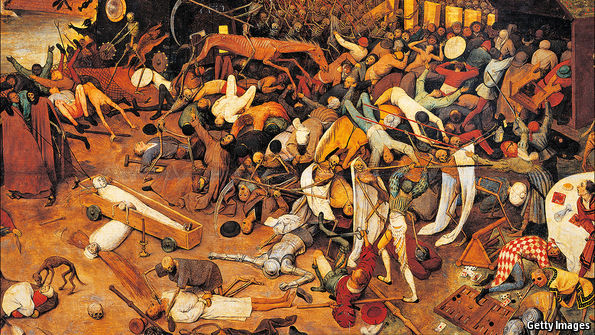Apocalypse then: The lessons of violence and inequality through the ages
Apocalypse then
The lessons of violence and inequality through the ages
from The Economist
In “The Great Leveler”, the author oddly welcomes the Great Depression because: 1) real wages risen; 2) the incomes of the affluent fallen
The author puts the discussion of increased inequality in works of Piketty, Atkinson & Milanovicinto a broad historical context
He finds that inequality is almost always high or rising as political and economic power buttress each other and both pass down generations
Large-scale levellings: 1) epidemics; 2) the collapse of states and economic systems; 3) total revolution; 4) the war of mass-mobilisation
Violence is sometimes effective but does not lead to greater equality. Most popular unrest in history failed to equalise
Mass-mobilisation warfare was the cause of the unprecedented decrease in inequality. The deployment of national resources soaked the rich
Low inequality factors: 1) income tax (94% 1944 US); 2) property tax (77% 1941); 3) physical damage; 4) post-war inflations; 5) trade unions
Following Max Weber, he thinks democracy is a price elites pay for mass warfare & finds it has no effect on inequality like classical Athens
Catastrophic levellings like Epidemics, revolutions & wars will be less likely in future. General prosperity risen. Global inequality fallen
Attempts to ease inequality democratically through redistribution & the empowerment of labour can hardly change the trend & may prove futile
Other possibilities: 1) good, unknown transformation may come in the future, or AI may acquire its own will & change the trend
2) civilisational collapse might be worth paying for the Utopia. Wealth may concentrate itself over time; the ability to destroy does not

